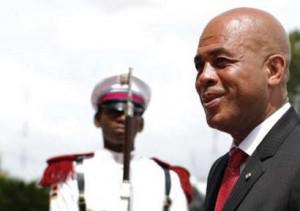
Earlier this week it was announced that the first contingent of Haitian soldiers had returned from Ecuador after completing their training. This announcement has understandably been met with concern, as Haiti’s relationship with its armed forces has been a tortured history of internal repression, consisting of human rights abuses and coup d’états. It is primarily due to these reasons that former President Jean Bertrand Aristide (himself a victim of a coup in 1991) took the necessary steps to disband the army in 1995 in order to help cultivate what he hoped would become a climate of political stability. During his exile in the United States, an estimated 5000 people were killed, with hundreds of thousands displaced due to the actions of the ruling military/paramilitary government.
While self-preservation was an obvious motive for Aristide disbanding the military, leaving only a marching band in its place, the 1991 coup d’état against Aristide was the 32nd for Haiti. History has demonstrated that Haiti’s military has often and violently intervened in Haiti’s political process, limiting the growth of important democratic institutions of governance or destroying them entirely.
While Haiti’s political landscape after 1995 was extremely polarized between popular organizations and the elite, it cannot be ignored that important progress was achieved due to the disbanding of the army. Unlike anytime in its previous history, since the disbanding of the army there have been three peaceful transitions of presidential power (Aristide to Preval in 1996, Preval to Aristide in 2000, and Preval to Martelly in 2010). The major interruption to this came with the second coup d’état against Aristide in 2004 – in which paramilitary organizations made up of former soldiers and the United States, Canada and France worked in concert to remove the democratically elected government and neutralize the popular movement for reforms based on the principles of social justice.
Despite this history, during his presidential campaign in 2010, Michel Martelly promised to restore Haiti’s army as a way to restore national sovereignty, provide employment and security. In 2011, a proposal written by President Michel Martelly’s administration was leaked to the Associated Press, which outlined the $95 million plan to restore the Haitian army to an initial standing force of 3,500 soldiers.
While President Martelly argued that the restoration of the army was an “urgent task”, the AP’s Trenton Daniel noted that “Haiti's government notes in the report that it does not face any threat from other countries but says a new army is necessary to patrol the porous border with the Dominican Republic, now frequently used by drug traffickers and for other types of smuggling.”
Indeed, the leaked proposal cited internal threats as the primary motivation for the restoration of the army, stating that “The fragility of the Haitian state now makes it vulnerable to the risks of internal unrest that could plunge the country into anarchy.”
It is primarily due to the legacy of internal repression against political opposition that there has been widespread opposition to the restoration of Haiti’s army. Reed Brody of Human Rights Watch remarked that “The Haitian army has basically been an army that's been used against the Haitian people… It was there as an instrument of repression, so it's hard to see what Haiti gains by bringing back the army.” Furthermore, a poll conducted over several years by Robert Muggah revealed that 96% of the Haitian people surveyed opposed the restoration of the army.
Martelly’s opposition has also voiced their opinion against the restoration of the army, with Senator Moise Jean-Charles arguing in favor of a civilian police force stating that “We don't have anyone we're going to war with… We need to strengthen the national police and build departments inside it to secure the country”.
Despite the numerous issues regarding reconstruction, cholera, health, education or food security, Martelly has forged on with his plan to restore the army. While the first contingent of Ecuadorian trained Haitians is rather small (consisting of 30 soldiers, 10 engineers and 1 officer), it does highlight an important contradiction in Martelly’s thinking. In a recent interview with the Associated Press, Haiti’s Defense Minister Jean-Rodolphe Joazile remarked that “Haiti's needs are not in the infantry but in technical service… The country is in a state of reconstruction. We need mechanics.”
While there is no doubt that Haiti is in need of technical services, why doesn’t Martelly mobilize recent graduates and international donors in order to develop training programs in areas of need such as engineering, healthcare, education and agronomy? Why involve the military or Ministry of Defence in matters relating to the construction and rehabilitation of public infrastructure?
It would be a refreshing change to see Martelly so determined to consider the strengthening of an accountable civilian police force and the funding of a technical training/education program would be an important step towards bring about security, reconstruction and meaningful human development as“urgent” tasks.
Martelly’s strategy of restoring the military to contain internal opposition instead of engaging and listening to their legitimate concerns that has led to so many past horrors and should be avoided at all costs. It is the existence of widespread poverty, underdevelopment and inequality within Haiti which make it prone to such “internal unrest” – and the fact that Martelly is choosing to restore the army instead of taking concrete steps to mitigate these problems is a worrying sign about his priorities for the Haitian people and the fragile state of democracy.
Kevin Edmonds is a NACLA blogger focusing on the Caribbean. For more from his blog, "The Other Side of Paradise," visit nacla.org/blog/other-side-paradise. Edmonds is a former NACLA research associate and a current PhD student at the University of Toronto, where he is studying the impact of neoliberalism on the St. Lucian banana trade. Follow him on twitter @kevin_edmonds.

